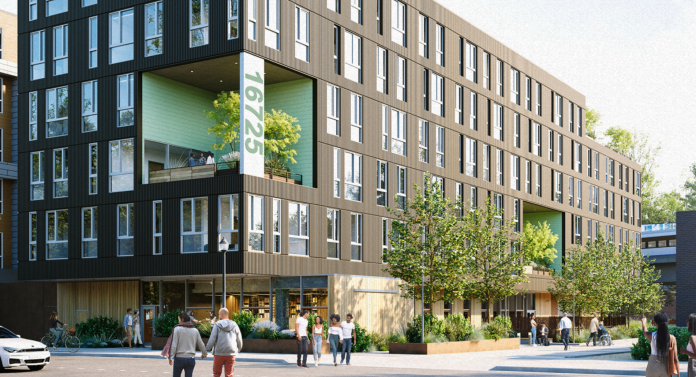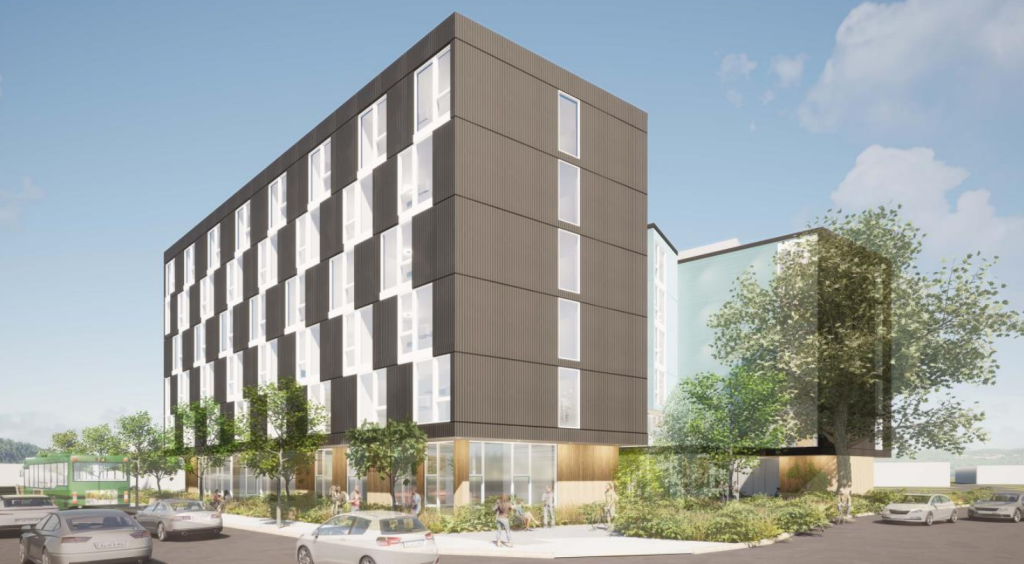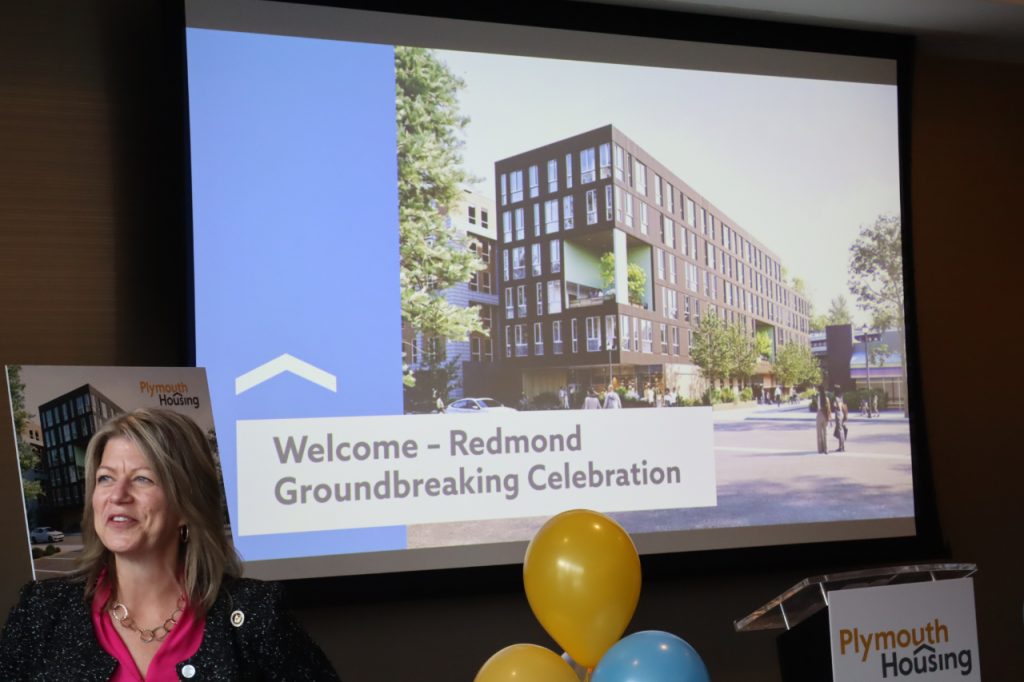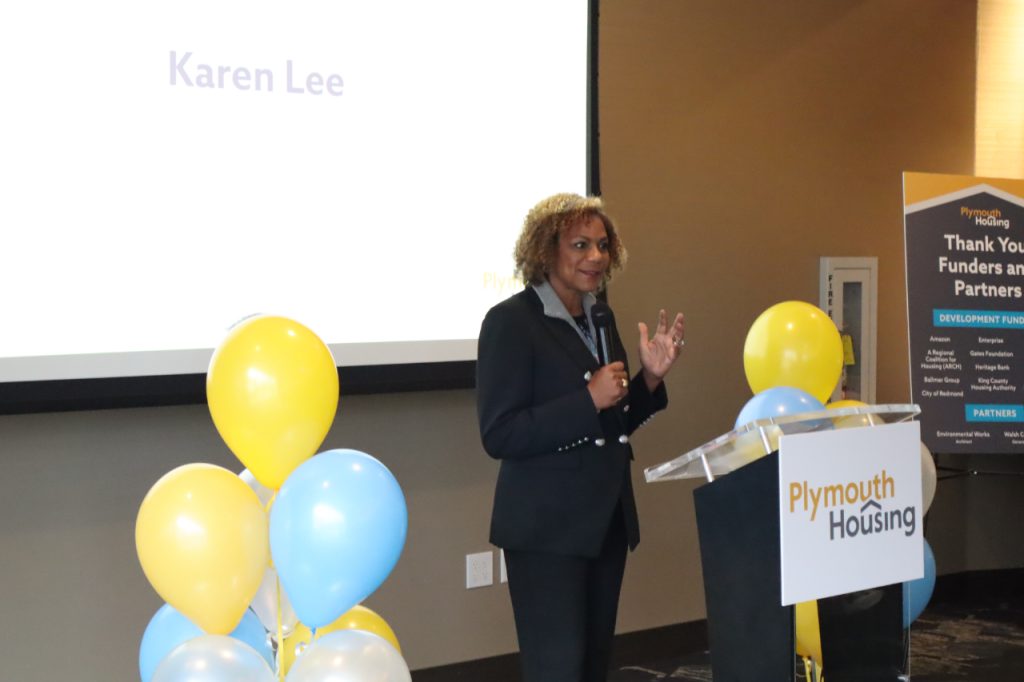
Plymouth Housing celebrated breaking ground on 100 units of permanent supportive housing in Downtown Redmond last week, marking a pivotal moment for a project that has faced a long line of barriers to getting shovels in the ground.
Located at 16725 Cleveland Street, steps from Downtown Redmond’s light rail station, Plymouth’s new building will be tailored for individuals exiting homelessness with 85 studio and 15 one-bedroom units. This will be Plymouth’s second building on the Eastside, after Bellevue’s Plymouth Crossing, which opened two years ago.
The project started life in Kenmore, after a 2021 request for proposals brought Plymouth to the table to turn the Kenmore City Council’s purported focus on affordable housing into reality.
Despite a unanimous council vote to move forward with the project in 2022, things changed dramatically in 2023 as opposition ramped up to the idea of building a six-story building for formerly homeless individuals at such a prominent location in Kenmore, steps from the city’s main business district. Those concerns compounded on top of misinformation that Kenmore was building a homeless shelter, something that was reinforced by mainstream news coverage.

“Kenmore residents call homeless shelter plan ‘bait and switch’ after proposal changes,” read a KOMO news headline that was later corrected to “homeless housing plan.” Kenmore city staff who had been working on the project for 18 months attested to the fact that there was never a change in the building’s targeted demographics, but the writing was on the wall.
After a nearly nine-hour public meeting that stretched into the wee hours in December of 2023, the Kenmore City Council voted 6-1 to reject Plymouth’s development agreement, reaffirming that decision the next month after three new councilmembers were sworn in.
The council’s decision drew high-profile criticism from other elected officials, including County Executive Dow Constantine, who called the move an “embarrassing failure of leadership.” Meanwhile, Plymouth Housing staff were acting fast to see whether another government partner could be found — no small task, given that Kenmore had been set to provide both public land and a $3.2 million subsidy.
“When I was approached for this project, I was informed that another jurisdiction was struggling to make it work for them,” Redmond Mayor Angela Birney told the crowd at Wednesday’s groundbreaking, calling out Redmond’s Planning and Community Development Director Carol Helland. “She came to me and she said, ‘Hey, so this is happening in another jurisdiction. You know we need more permanent supportive housing on the Eastside. Maybe we could take a look and see if Redmond could take it over and move it here and make it happen on some land that we maybe have.’ And I don’t think I even hesitated. I was like, ‘Yeah, let’s, let’s figure out how to make this happen. Let’s make it work.'”

By a 5-1 vote last February, the Redmond City Council voted to approve the land transfer that would allow Plymouth to keep the rest of its assembled financing in place. But the project didn’t exactly face smooth sailing in Redmond, either, despite that quick action by the council. The expedited process drew criticism for a perceived lack of transparency, and the permit process dragged on after a series of appeals were filed against the approval of specific building elements, including a reduction in the amount of required off-street parking. In July, those appeals were dismissed, clearing the way for a construction permit.
That fight over a reduction in the amount of parking required on the Plymouth site even inspired a statewide initiative campaign, as the group Safe Eastside filed to collect signatures to repeal a statewide parking reform bill and a transit-oriented development bill that would have expanded exemptions from state environmental law for infill development. That campaign did not turn in any signatures by the deadline earlier this summer.
“Those that work in this space know that permanent supportive housing, or PSH as we call it, is probably the most challenging kind of housing to make it happen,” Lindsay Masters, the Executive Director for A Regional Coalition for Housing (ARCH), said at the groundbreaking. Among the project’s other funding sources, ARCH is contributing around $3 million, funds contributed by cities across the Eastside.
Permanent supportive housing projects have drawn opposition across Puget Sound, with critics citing a perceived increase in crime around similar facilities. While data on Bellevue’s Plymouth Crossing project has shown an increase in first responder calls to a campus that includes the men’s shelter Porchlight, the crime rate in the area has declined. “[T]heft has decreased in the 0.5 mile radius of the Eastgate campus since 2022 (pre-opening), in line with the citywide decrease in theft and other property crime,” a memo provided to the Bellevue City Council just last month noted.

“From the site, financing, the operations, the day-to-day coordination with service delivery, meeting the needs of people who have really complex needs, and in a lot of communities, those are the challenges that stop this kind of housing from happening,” Masters continued. “So when this project faced a pretty overwhelming tide of opposition, hostility, fear, it could have just been the end of the project, but neither ARCH nor Plymouth was ready to give up, and instead, we looked across our coalition to see who was willing to help. The City of Redmond not only answered the call, they went above and beyond.”
Ultimately, the region is set to need many more buildings like the one taking shape in Downtown Redmond. According to King County’s Affordable Housing Committee, nearly 43,000 units of permanent supportive housing will be needed to meet demand for that type of facility through 2044. Reaching such a lofty goal stands in stark contrast to the prolonged process that played out in Kenmore and Redmond.
“Redmond knows how to quickly build affordable housing. And I think that it’s a model that many of our other suburban cities can study and do,” Karen Lee, Plymouth Housing’s CEO, said. “I think that you can stand up and say this is the way that it gets done.”
Ryan Packer has been writing for The Urbanist since 2015, and currently reports full-time as Contributing Editor. Their beats are transportation, land use, public space, traffic safety, and obscure community meetings. Packer has also reported for other regional outlets including BikePortland, Seattle Met, and PubliCola. They live in the Capitol Hill neighborhood of Seattle.

